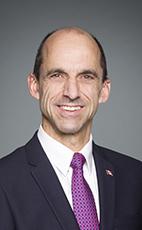Mr. Chair, it is my duty to speak this evening to support our important mission in Afghanistan.
By the way, I will be sharing my time with the hon. member for Edmonton Centre.
I support this mission for two reasons that have been given this evening. The first reason is that the mission is to make Afghanistan a safer place and to fight the terrorism there. The second reason, which has been well explained this evening, is that it supports the reconstruction effort of a country that has gone through decades of war and conflict.
We have been asked this evening whether the Conservative government has shown leadership. In the early days after being elected, our Prime Minister went to Afghanistan. He stayed there and met with the troops. He went straight to the source. He also met the leaders. He clearly showed the type of leadership we should expect from the head of the nation.
It is important to point out that 36 countries are currently involved at the United Nations. We are there at the request of the Afghan people. The United Nations has endorsed this mission.
We have the privilege of living in a free and open society that allows us to hold debates like this one this evening and demonstrations like the one that was held tonight outside these halls. It is not a right but a privilege that we owe to our ancestors who fought to give us these rights and freedoms. Too often, in the comforts of our modern lives, we forget that these people went to battle to make sure we could have these rights and freedoms.
It is in our national interest to ensure that a free and prosperous Afghanistan is nurtured through this difficult part in its history. Canada is helping Afghanistan to become a stable, democratic and self-sustaining state so that it will not serve as a haven for terrorists who threaten global and Canadian security.
Afghanistan currently represents our most important overseas military deployment. There are over 2,000 soldiers from various military bases, including bases in Quebec like Valcartier.
Our mission in Afghanistan involves not only peacekeeping but also the rebuilding of the social fabric of this state; there are two parts to the mission we are working on there. We are helping the impoverished, the poor and the destitute to a better quality of life with programs that rebuild the national solidarity structure.
This evening, the Minister of International Cooperation gave examples of microeconomics and small practical projects. For instance, a dressmaker received a loan to buy sewing machines, so that now she and her children can make and market clothing.
We are in Afghanistan to support a mission recognized by the United Nations and at the request of the Afghan government. We hope Afghanistan will become a stable, democratic country we can rely on for support. Our national security depends on it.
Canada has also promised to help the Afghan people. We intend to keep that promise. We must do more than just give our word. We have to be ready to stand up for our convictions and do what is needed to safeguard Afghans' security and, by the same token, our own.
This mission is part of the proud tradition of Canadian missions to protect rights and freedoms to the best of our ability.
While our soldiers are putting their lives on the line in the streets and mountains of Kandahar, they need to know that they have the unwavering support of our decision-makers and the members of this House, who made an informed decision. I am certain that the hon. members will agree that the men and women of our armed forces deserve our support and our respect.

